News & Events in Belarus
Lukashenko sees talented young people as main treasure of Belarus

Aleksandr Lukashenko visits the National Children's Technopark, September 2023
The younger generation is always seen as the future by any nation. But let us not forget: young people are not only our future. They are also our present. The older generation created a successful state - the Republic of Belarus. They have kept it together and multiplied its heritage. The mission of the young is to preserve all this and give the country a new impetus. But have the right conditions been created for this? In this episode we will discuss the youth policy in Belarus. We will also tell you what advice Aleksandr Lukashenko gives to students and graduates from year to year, and how schoolchildren made the president's face lit up with happiness. Literally.
How does Belarus support talented young people?
Almost in every episode we go back to the 1990s in one way or another. That time was difficult and required big strong-willed decisions, thanks to which Belarus became a strong state. This applies not only to the economy and industry, but also, for example, to youth policy. Aleksandr Lukashenko made the first steps in this direction literally in the first days of his presidency. On his initiative, the country formulated the state youth policy, defined its main avenues and laid down the legal foundations.
At that time, in the mid-1990s, young people were reluctant to go into science or art. The best graduates of Belarusian universities tended to go abroad. To change the situation, the government began to pursue a targeted policy to support Belarusian science and culture. One of its priorities was to help talented young people. The idea of creating special presidential funds to support gifted students and talented youth emerged back then.
In 1996, Aleksandr Lukashenko signed relevant decrees. For the past quarter of a century the presidential funds have rewarded about 5,000 pupils and students, almost 4,000 teachers and researchers, and 314 teams. They have helped 127 scientific laboratories in educational institutions to upgrade their teaching and production facilities and introduce a number of advanced methods and developments.

It should be understood: the title of fellowship recipient and award winner of the presidential fund is not just an award. It is a sign that the state assumes responsibility for the further professional development of a laureate.
Later, presidential scholarships were established. They are awarded to students, cadets and postgraduates for academic excellence and successes in research and creative activities.
“Looking at you, determined, ambitious and beautiful young people, I am confident that our dear Belarus will become even better and more beautiful. I believe that you will do everything for this. You are the most important thing in our life, in the life of the older generation. We are always there for you. We will do everything to make you feel our shoulder and care as you work towards your goals. It is your time to write the history of our country - your country. Godspeed!” Aleksandr Lukashenko said addressing the graduates this year.
The story of the children's technopark in Belarus
But encouraging talented students is one thing. Finding gifted kids, helping them see their talent and bringing it to its full potential is quite another story.
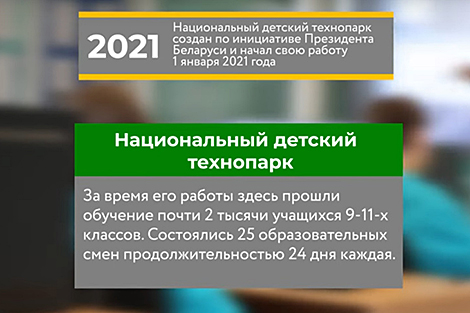
It is not an easy task. But it is all the more interesting.
The National Children's Technopark opened in Belarus in 2021.The idea to create such an institution emerged long ago. Back in 2015, Aleksandr Lukashenko visited the Sirius educational center in Sochi. Vladimir Putin was his guide then. Then the presidents agreed that the center would enroll Belarusian children too. Three and a half years later, the heads of state visited Sirius again. Then the Belarusian president announced that Belarus was opening a similar center - a technology park.
“I had visited the place several times and studied the center inside out. Russian President Vladimir Putin was my guide back then. It was his idea to set up the Sirius center in Sochi. Back then I told him that it would be a good idea to create a similar technopark in Belarus and suggested that Sirius provide us support. He gave the instruction right away. Thus, this center here draws on Russia's experience first and foremost and international experience too,” Aleksandr Lukashenko shared the background of the National Children's Technopark on the Day of Knowledge.
What programs does the children's technopark run?
Almost 2,000 students of 9-11 grades have graduated the National Children's Technopark. It has run 25 educational shifts lasting 24 days each. Competition in the technopark is three people per place. Remarkably, most of the guys who make it through competition and get admitted are not from Minsk.
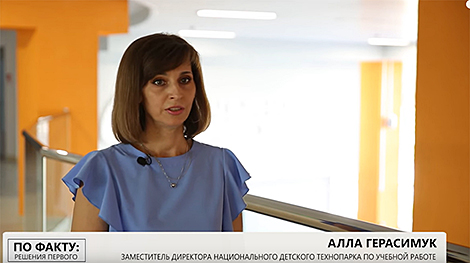
"We have a very even representation of the whole country. We have a lot of students from rural communities. This shows that children do have an interest and have access to information and also the opportunities to prepare accordingly in order to enter our training programs, said Alla Gerasimuk, Deputy Director For Education at the National Children's Technopark.
In the technopark, children learn new knowledge and skills across 15 areas that are most promising for the economy. These are green chemistry, ICT, robotics, engineering ecology, biotechnology, nano-industry & technology, energy of the future, electronics & communications, architecture & design, information security, laser technologies, VR & AR, automotive engineering, natural resources, & aerospace technologies. Sounds super cool, doesn't it?
A robot-guide and an innovative flying vehicle
For example, Pavel Starikovich, a student of Secondary School No. 4 in the city of Vitebsk, is working on a project of an unusual robot. His future device, as designed by the guy, will examine the pipes at enterprises.
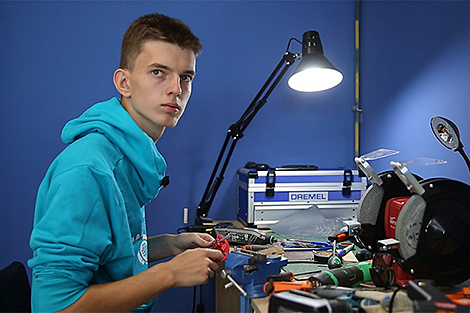
“This robot will be needed to explore places inaccessible to humans. For example, in many factories, they go all the way up to the ceiling, as it's unsafe and time-consuming for a human to climb up there,” Pavel shared details of his project.
His friends decided to make a robot - guide. They assembled it from a robotic kit and programmed it.
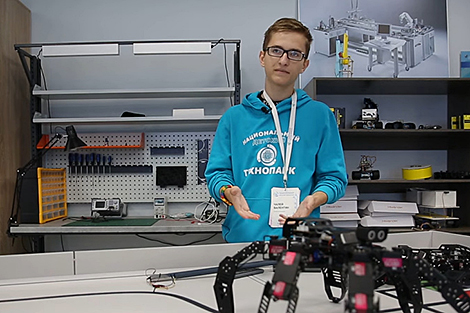
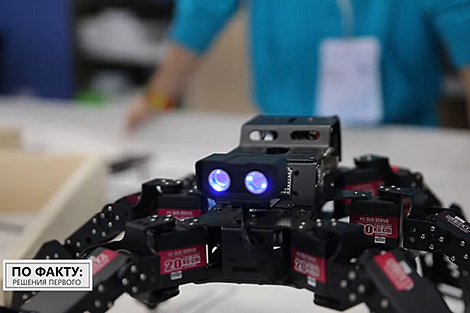
"In our lab, we have several kits that we use for our projects. They can be fully programmed - from walking to detecting some conditions, temperature, obstacles, and so on. Using this robot, we are going to make a robot - guide for visually impaired people. A handle will be attached to it. It has all the wires and a motor that will tell you where to turn,” Valentin Chalei, a student of Polotsk Secondary School No. 14, said as he presented the project.
"Children here are passionate about aviation, astronautics, and astronomy. Our job is to inspire them, to help them to learn more, enter an aviation university and become a motivated specialist,” said Dmitry Yakovlev, the held of the aerospace technology lab.
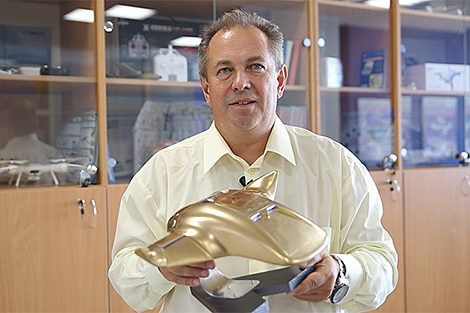
Mining and unusual herbal teas
As you understand, the developments being carried out in the technopark are entry-level developments, said Evgeny Kukharik, a teacher of the Natural Resources program, Candidate of Geological and Mineralogical Sciences. “We give kids the knowledge and skills for them to grow into good specialists and it's a big thing. We strive to provide talented children with an opportunity to realize their scientific potential in geology, paleontology, extraction and processing of minerals.”
For example, Pavel Krapivin, a student of Orsha Secondary School No. 8, together with his teacher, improved field development technologies. Pavel noted that in Belarus, more than 50% of active quarries are waterlogged.Therefore, an important task is to create the right conditions for extraction of mineral resources.
“At first, my teacher and I sorted out the types of groundwater in online sessions. Then, I conducted an experiment to determine the moisture capacity of rock and summarized some preliminary results. Some minerals when interacting with moisture lose their qualities and become unusable. We looked at the types of equipment that are used in mining, specifically in waterlogged conditions. I determined the rock filtration coefficient and developed recommendations for sand and gravel mining in waterlogged quarries. In this way, we improved the technologies of quarry development. This is a very relevant topic, because Belarus is actively building roads, and sand and gravel mixture is their main component,” the young researcher said.
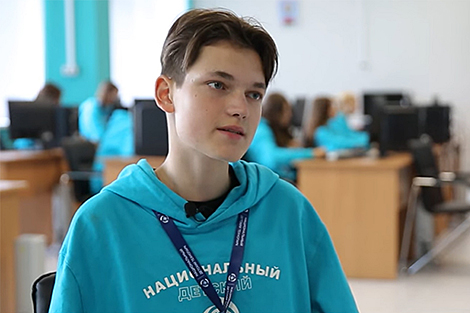
To enter the National Children's Technopark students need to defend their research projects. Then, during an educational shift in the technopark, students work on it together with teachers and present the results.
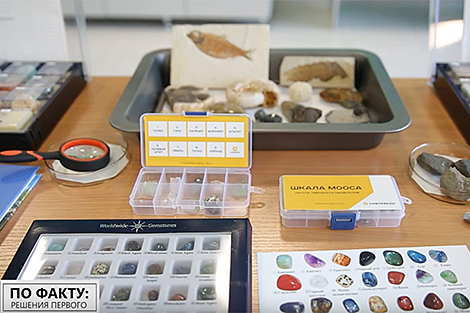
For example, students of Biotechnologies worked on a collection of phyto teas. “We have developed a set of phyto teas on the basis of the heraldry of the Belarusian regions. The project included all the coats of arms and plants pictured on them. We have compiled herbal collections,” head of the Biotechnologies laboratory Liya Sakovich said. “There is phyto tea, where walnuts are used instead of classic tea bags. The walnut shell secretes iodine in small amounts. Most people living in Belarus lacks iodine because of the Chernobyl accident.”.
Mushroom-shaped lecture hall and information security
In the technopark, children enjoy the freedom to create. This inspires them to dream about the future and to create it. Most importantly, they strive to make their homeland a better, more beautiful and advanced place.
“I became interested in architecture as a child. I was really fond of drawing. This resulted in what you can see on the canvas now. It is a project of a natural and educational recreation area and lecture hall called Natura. The building comes in the shape of Hydnellum Peca mushroom which can be found in Europe. I see my object built in Miory District near the well-known wellness resort Rosinka, on the shore of the lake,” Stepan Kovalenok, a student of the Postavy gymnasium, said.
His friend from Molodechno Valeriya Alekseyeva is working on a pavilion of contemporary art. “It will be located in the open air under canopies. It will be accessible from different sides. I have spent much time on choosing different forms, and today I think I have finally found something interesting. It would probably be difficult to see something like that erected in Molodechno, but if it was installed there, I think it would draw crowds,” the student of Molodechno secondary school No.2 said.
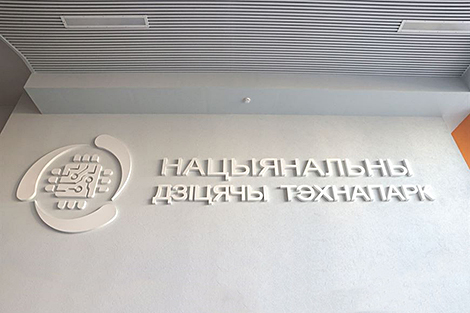
Anzhelika Rodulevich is also from the Postavy gimnasium. She has a passion for philology, but decided to try her hand at information security and enrolled in the technopark. “Some six months ago I decided to enroll in the National Children's Technopark. I learned about it from a friend of mine, who had been here many times. I am a linguist, I study languages. I have decided to grab this opportunity. Now I am engaged in a project to analyze methods of obtaining unauthorized access to the data of information network users,” she said.
“If they succeed and the project is recognized as promising, they take up distance learning and thus can prolong the work on their project for up to three months and take it to another level. Not long ago the students got a patent,” Sergei Petrov, lecturer of Information Security, Candidate of Technical Sciences, said.
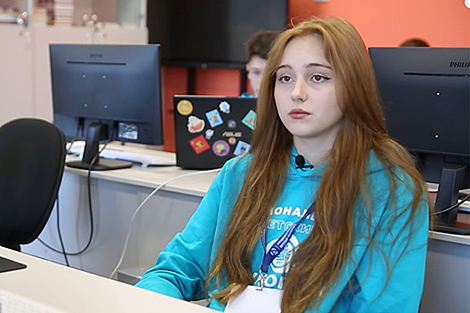
Belarus surely lacked such a facility. Therefore, it comes as no surprise that the president's face was glowing with happiness during his visit to the Children's Technopark. School students demonstrated to the head of state their project on reading emotions.
The next task for the technopark is to implement new developments
Well, the key task was accomplished. The country has set up a cluster for work with gifted youth, with the National Children's Technopark being its core. But it seems that for the head of state it was just a step on this path. The new idea is to help children to implement their developments in life. Plans have been outlined, and pointmen have been appointed.
“One of the tasks is to establish close cooperation with manufacturers. We will inform enterprises about the research our children are conducting. We expect that manufacturers will somehow involve our students in solving their specific production tasks. Thus, young people will see that their work is in demand,” Alla Gerasimuk said.
Making the best use of the youth's potential. An example of Belarus
In the early 2000s, Aleksandr Lukashenko expressed concerns that the powerful potential of Belarusian youth was underused in Belarus. He criticized officials for dismissing youth initiatives, avoiding direct communication with young people and addressing acute issues, and failing to involve young people in public affairs. The president emphasized that such work was vital to avoid negative manifestations in the youth environment.
“I've always said and I repeat it today: talented people, the intellect of the nation represent the greatest treasure for Belarus. If we have such people, we will overcome any challenges. We may do without large supplies of oil and natural gas. You also contribute to the lasting sovereignty and statehood. You are the future. You are the smartest and you have proven it. In literally several years you will govern this country, protect this country, and raise your kids in this land. Even if some of you leave the country for some time, you will come back with new knowledge,” Aleksandr Lukashenko said as he visited the National Children's Technopark.
Belarusian young people have a great potential. Here is a vivid example. In 2011, the BRSM Youth Union launched a campaign for the best innovative project. The union called it 100 Ideas for Belarus. It was expected to be a small event, but more than 1,500 young people submitted their ideas to the contest. Among the participants were also Belarusians from Russia, Moldova and even Canada. The campaign became an annual event. “Idea boxes” were placed in educational institutions, enterprises, and large shopping centers. Exhibitions-presentations of the best projects were held in regional centers and districts. A few years later, the international youth projects 100 Ideas for the Union State and 100 Ideas for the CIS were launched.
“In total, more than 18,000 projects have taken part in the campaign over the years. More than 3,000 of them were implemented in the real sector of the economy. An array of preferences is available to participants. Through participation in the national contest of innovative projects our young people are eligible to grants, and winners get free assistance in drawing up business plans. Last year, another innovation was introduced. Now winners have the right to be included in the special fund of the President of the Republic of Belarus for the support of the talented youth,” Yekaterina Lakisova, head of the national youth project 100 Ideas for Belarus, said.
How robots can help in studies
Can you imagine: thousands and thousands of ideas! Each of them found support at one level or another. Among the finalists of the past season was a team that comprised a school student, a university student and a teacher. They presented scientific interactive game Yas, which assist in learning the Belarusian language. The idea for the project goes back several years. The first serious steps were made during the pandemic. It turned out then that there were not enough materials for distance learning, but it was still necessary to get students ready for school and university exams. The main phase, however, was the participation in the youth competition of initiatives.
“We believed in ourselves and have always felt the support of the authorities. Whoever wants to put their innovative idea into practice can definitely do it. We know it for sure. My students have already finished school and have been doing their third year at university. Together with other students we have developed another project as a continuation of the first one. It is an educational complex Yas with robotics features,” Nikolai Kurilovich, Belarusian Language and Literature Teacher at secondary school No.111, said.
The development includes a website, a voice assistant and an interactive game. Maksim Atrakhimovich, a student of secondary school No.111, unveiled the details of the project.
“During the game, students use a robot that acts as an interactive chip. The robot Yas checks the students' answers for correctness. If it is sad, it means that the answer is not correct and the team does not progress. If the robot smiles, the answer is correct and the team moves ahead. Whoever reaches the finish line first wins. We have developed the project and the robot Yas together with a classmate in the Python programming language. We continue working on the new part of the project, which will cover all sections of linguistics,” the teenager said.
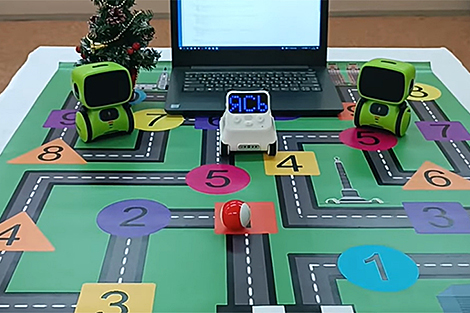
Nikolai Kurilovich's former student Aleksandr Melgui (now studies at the Belarusian State University) worked on the voice assistant. “The voice assistant Yas is the main interactive part of the project. It represents voice files that come in the form of a mobile application. The mobile app has a search box where we enter the topic we need to study. Then we press the button and listen to the necessary information.”
Indeed, young people know very well what they want to achieve, what heights they want to reach. The president always advises them to do everything in time. It will be difficult to do this later as they will surely be preoccupied with other things by then. The head of state says that one should strive for success, first of all, in one's native land.
“Some of you think ‘out there' is easier and better. Learn from other people's mistakes. Reach out to those who are there, ask how they are doing. Then make a decision. Anyway, take your time. Try it here first. You can also go abroad. Then you will have something to compare. Getting things done on time is also important and I often talk about this. The day after tomorrow you might be caught up in a storm you will find difficult to cope with. Your experience of yesterday and today will make tomorrow easier for you,” the head of state addressed the youth.
The heroes of this episode and thousands of other Belarusian young people look into the future with burning eyes. We all need to make sure they keep this fire in their eyes. For this our children should see and feel that their country needs them.


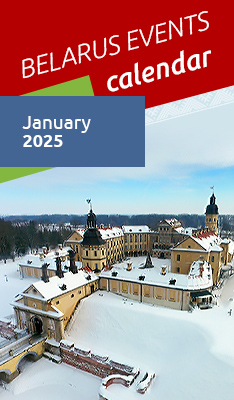




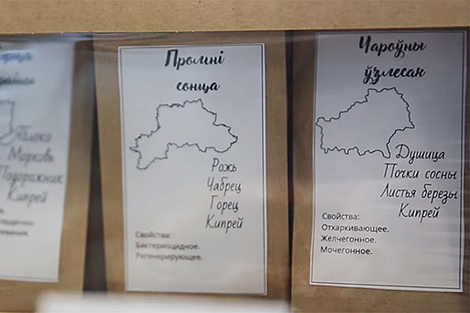
 print version
print version make home page
make home page add to bookmarks
add to bookmarks

